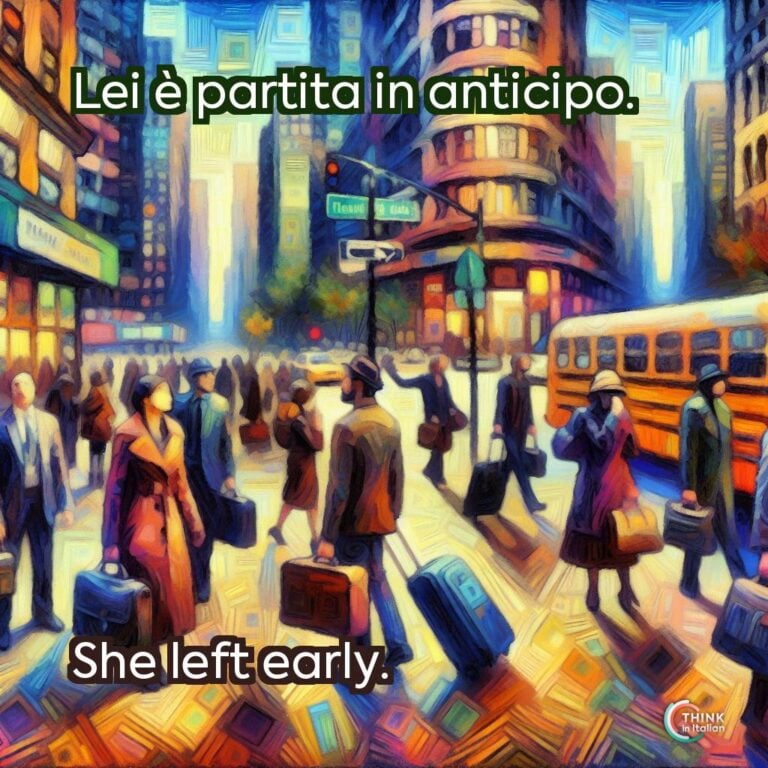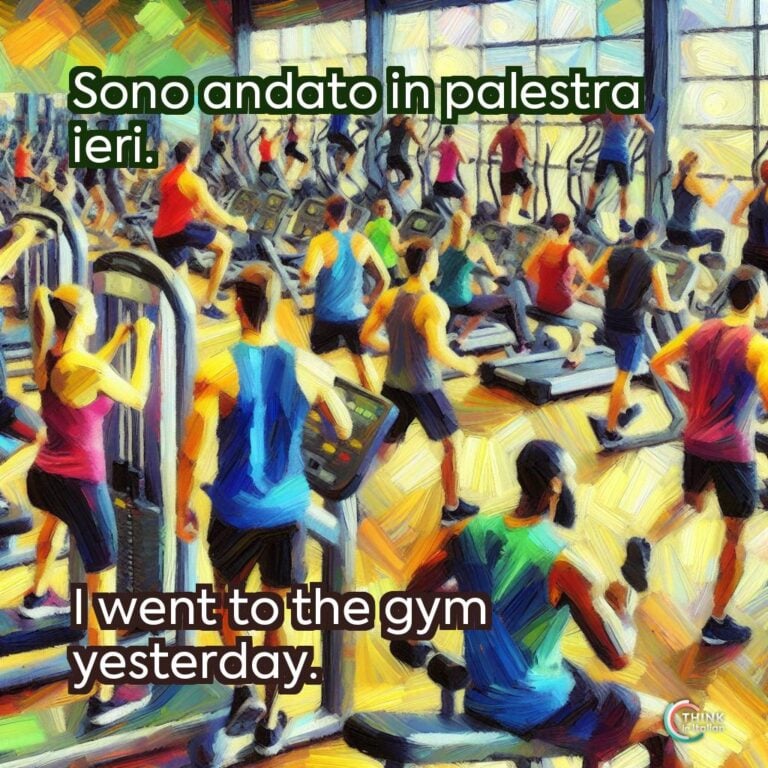Past Tense in Italian
Passato Prossimo
The Italian passato prossimo is a compound verb that corresponds to the English present perfect. It is used to express events and actions that are concluded and completed in the recent past.
It is composed of the present tense of the auxiliary verb avere (to have) or essere (to be) + the past participle of the main verb.
Hai mangiato la pasta che ti ho lasciato?
No, sono appena tornato a casa.
Have you eaten the pasta that I have left for you?
No, I have just come back.
Essere or Avere?
As you might know already, the choice between avere and essere depends on the verb:
- avere is used with transitive verbs: they select a direct object which requires no preposition to be introduced. Examples of transitive verbs are mangiare (to eat), guardare (to look), prendere (to take)…
- essere is used with intransitive verbs: they select an indirect object and, therefore, require a preposition to be liked to their object. These intransitive verbs usually indicate motion or a change of state.
Movement Verbs in Italian
Examples of Italian Movement Verbs
Let’s have a look at a list of the most common movement verbs in Italian:
- Andare: to go
- Arrivare: to arrive
- Cadere: to fall
- Correre: to run
- Entrare: to enter
- Partire: to leave
- Salire: to go up
- Saltare: to jump
- Scappare: to run away
- Scendere: to go down
- Venire: to come
- Uscire: to go out
I miei genitori sono appena arrivati.
My parents have just arrived.
Teresa non è venuta alla cena.
Teresa didn’t come to dinner.
Most of the movement verbs in Italian are intransitive, but in some cases they behave as transitive verbs. This has a huge consequence on the choice of the auxiliary verb. It might sound confusing, but let me give you a tip to spot them correctly.
Movement Verbs: Essere or Avere?
When facing a movement verb and doubting whether it is transitive or not, look for either a direct object or a preposition. How can you do that?
Find the verb, and then ask yourself: “Who? What?”. If you can answer this question directly without using any preposition, then you found the direct object of the sentence and are, therefore, dealing with a transitive verb. For example:
I ladri hanno saltato il cancello.
The thieves have jumped the gate.
Here, the verb saltare (to jump) is undoubtedly a movement verb. But ask yourself: “what did the thieves jump?”, “the gate”. If you could answer this question without the use of any preposition, you found the direct object.
The direct object is il cancello (the gate) and therefore the verb saltare is a transitive verb. As a matter of facts, the auxiliary verb that is used is avere.
Il tappo della bottiglia è saltato via.
The bottle cap has popped off.
Again: “what did the lid jump?”… You cannot answer this question. In fact, the verb saltare here is intransitive, and this is confirmed by the auxiliary verb essere.
How to Decide the Auxiliary Verb
In some cases, direct objects are not explicit, which makes the choice of the auxiliary verb even harder. To make things easier, I will give you some tips to help determine the correct auxiliary verb:
- Consider the verb’s use: reflect on how the verb is typically used. Some verbs naturally align with either essere or avere based on common usage patterns. For example, andare and venire typically use essere because they inherently describe movement and changes in location.
- Identify the context of the sentence: if the focus is on the action itself, it might be transitive and take avere, while if the focus is on the movement or the change of state, it might be intransitive and take essere.
- Check for implied direct objects: sometimes, the direct object is not explicitly stated. If you can infer a direct object, use avere.
- Check for intrinsic movement: verbs that describe intrinsic movement or a change of state often use essere.
Let me show you here some verbs that can use either essere or avere:
- Correre (to run)
Siamo corsi in strada appena abbiamo potuto.
We ran into the street as soon as we could.
Here, this verb is intransitive, because it focuses on the action of running.
Dove avete corso oggi?
Where have you run today?
Here, although there is no explicit direct object, the verb is transitive because it focuses on the action in a general sense, specifying direction or destination.
- Saltare (to jump)
Ho saltato tutto il pomeriggio.
I jumped the whole afternoon.
In this context, the verb is used transitively, although it might seem like there is no direct object. The time expression tutto il pomeriggio indicates the duration of the action, since the focus is on the action of jumping carried out over a period.
Sono saltato dalla gioia.
I jumped in joy.
Here, the verb is intransitive, because it focuses on the action of jumping as a response to an emotion (joy).
- Volare (to fly)
Mio padre ha volato come pilota.
My dad flew as a pilot.
In this sentence, the verb is used transitively because the focus is on the action performed by the subject (flying). Although there’s no direct object, the context makes it a specific action performed by the subject.
Sono volati tutti i fogli.
All the paper sheets flew.
Here, it is used intransitively because the focus is on the movement of the sheets of paper, which is a change in their state or position.
- Camminare (to walk)
Camminare is a special verb. Despite being a movement verb, it uses avere because it’s typically considered a transitive verb in Italian, focusing on the action itself rather than the change of state or intrinsic movement.
Siamo stanchi, abbiamo camminato tutto il giorno.
We are tired, we walked the whole day.
Grasping the Differences
In Italian, the choice between essere and avere as auxiliary verbs in the passato prossimo depends on the nature and context of the main verb.
Generally, transitive verbs take a direct object and use avere, while intransitive verbs do not take a direct object, denote movement or a change of state, and use essere, such as nascere (to be born) and morire (to die).
Some movement verbs can take either auxiliary depending on whether they are used transitively or intransitively: for example, ho saltato la corda (I jumped the rope) and il cane è saltato dalla paura (the dog jumped in fear).
When a movement verb is used transitively, the focus is on the action performed on something. Conversely, when the verb is used intransitively, the emphasis is on the movement or change of state.
Always remember that with essere the past participle must agree in gender and number with the subject, while with avere the past participle remains unchanged.




